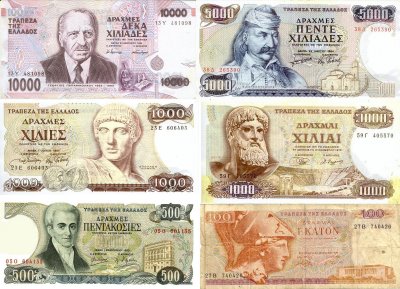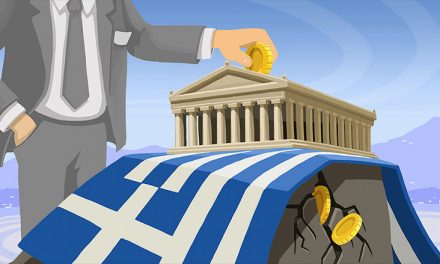By FLOYD NORRIS, The New York Times
Not all government debt is created equal. Some governments get a much better deal than others, and no one gets a better deal than the United States.
The United States borrows in its own currency, and it borrows at extremely low interest rates. It also borrows under its own laws, an often overlooked advantage. Such a situation makes default — or at least involuntary default — impossible because the government can print dollars if need be. The value of the dollars it repays may be less than the value of the dollars it borrows, but that is a risk the lenders accept. The United States could change its laws, but it is trusted not to abuse that right.
The perils of not having that flexibility became clear 80 years ago.
In 1933, when Franklin D. Roosevelt became president, the world was in the Great Depression and many countries were devaluing their currencies in a desperate attempt to stimulate exports and growth. That left the United States at a disadvantage, and one of the first things the president did was to persuade Congress to devalue the dollar.
The United States, like other countries, was on the gold standard. A dollar was worth 25.8 grains of gold, and anyone with a dollar bill could turn it in for that much gold. President Roosevelt and Congress redefined the dollar as being worth 15.238 grains and made it illegal for Americans to own gold coins. They were required to turn in their old gold coins for dollars at the new rate.
United States government bonds of that era specified that the payment of interest and principal was to be made in gold dollars, at the old rate. Many private bonds had similar provisions. Congress overruled all those provisions.
Was that legal?
In 1935, the Supreme Court answered. Chief Justice Charles Evans Hughes, with the support of four of his colleagues, concluded that the government could change the private contracts, just as it could pass a bankruptcy law that enabled some debtors to escape their obligations. But, he said, the government had no legal right to amend its own bonds.
Then, in a pirouette that left legal scholars gaping, he ruled that because it was no longer legal to own gold coins, a bondholder suffered no actual losses. Had the government paid gold coins, the bondholder would have been required to exchange them for dollars at the new rate.
It was not one of the great court decisions, at least in terms of legal logic. But it was necessary for the health of the American economy.
Consider what would have happened if the gold clause had been upheld, for both government and private debts. Suddenly any debtor who owed $1,000 in gold dollars would owe $1,690 in new dollars. But incomes would not have risen. Companies that were barely hanging on would have gone broke. The Depression would have become much worse.
Robert H. Jackson, who would later become a Supreme Court justice, wrote in 1941, “Any decision that upset the law as Congress had enacted it, however sound in lawyer logic, could only breed widespread trade mischief, commercial confusion and debtor disaster.” President Roosevelt deemed the issue so important that he planned to defy the court if the government lost the suit.
I bring this up because most sovereign nations now do not have the luxury the United States has. When they borrow internationally, they borrow in a foreign currency. And the bonds often specify that any disputes will be settled under foreign law — usually United States or British law.
Many recent national defaults stemmed in part from those problems. The 1990s Asian financial crisis began in Thailand, which had tied its currency to the United States dollar — and had borrowed a lot of dollars. When it was forced to devalue its currency, the baht, it suddenly owed far more baht than it had borrowed, not to mention far more than it could hope to repay.
Greece provides an even better example. Had its debt been denominated in Greek drachmas, its currency would have plunged in value when the Greek crisis unfolded. A lower currency would have helped some Greek exporters and brought in bargain-seeking foreign tourists. That would not have solved Greece’s fundamental problems, which include a bloated government payroll and immense tax evasion, but it would not have caused the depression that the country is still in.
Instead, the debt was in euros. Unable to print them, or to borrow more from suddenly fearful credit markets, Greece turned to the rest of Europe for a bailout that came with harsh terms.
The issue of which nation’s law prevailed was also important. Most Greek bonds had been issued under Greek law. Greece could, and did, change that law and force bondholders to exchange their bonds for new ones worth far less. But some of the bonds were issued under foreign law, and those bondholders could not be forced to give in. There were not that many such bonds outstanding, and in the end Greece continued to meet those obligations. In the summer of 2012, one such bond traded for 14 cents on the euro. Today it trades for 90 cents.
Obviously any country would prefer to borrow from foreign investors in a currency it can print, under laws it can change. But few countries have enough credibility with investors to do that. Right now, there are three: the United States, Japan and Britain.
Mario Draghi, the president of the European Central Bank, said on Thursday that a deal was needed to protect world financial stability, adding that “a short-term agreement produces less stability.” But, he told the Economics Club of New York, “The world still does not believe that the United States will not find a way out of this.”
That is why those who are warning of a disaster if there is a default on American debt might turn out to be wrong, or at least premature. If it is widely assumed that any default will be temporary, certain to be fixed in the immediate future, the reaction could be muted.
But there is no guarantee of that. Why risk destroying the United States’ world standing over a dispute about health insurance?
One part of the answer is that some Tea Party legislators ran for office on a platform of hating the government, with language about how evil it is.
That is extraordinary. There are people in the United States who view oil companies, or investment banks, as evil and say they would like to destroy them. None of them have managed to gain senior positions at Exxon Mobil or Goldman Sachs. But right now people who feel that way about the government seem to be able to prevent it from functioning if they do not get their way.
Fortunately, as the economist Henry Kaufman noted this week, “The U.S. dollar is the key reserve currency, and there is no immediate alternative to it. Not the yen, not the euro, not the Chinese currency.”
That means it might take a lot of craziness to destroy the privileged American position. It does not mean such destruction is impossible. The members of Congress who support the government — presumably a large majority — need to find a way to override those who oppose it.
In 1935, Justice James Clark McReynolds wrote for three of his colleagues in denouncing the decision to allow the United States to renege on its promises. His opinion concluded, “Loss of reputation for honorable dealing will bring us unending humiliation; the impending legal and moral chaos is appalling.”
He was wrong. By the time the decision came down, it was clear that the repudiation of the gold clause had not destroyed the government’s credit. Decades later, the economists Carmen M. Reinhart and Kenneth S. Rogoff would classify the repudiation as a default, but in 1935, most Americans — and most foreign lenders — did not see it that way.
But the McReynolds forecast could come true if defaults become acceptable in pursuit of partisan political advantage. Then the unique position of the United States could erode or even vanish.
“To throw that away,” said Robert J. Barbera, the co-director of the Center for Financial Economics at Johns Hopkins University, “would be the single greatest mistake in American economic history.”



















